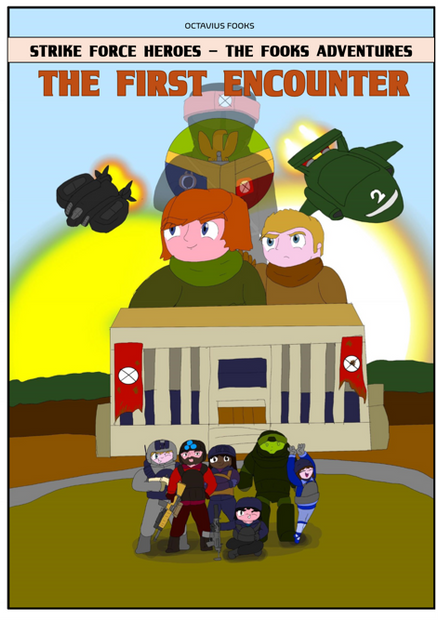HOME | DD
 history-nerd — How to be a forgotten hero
history-nerd — How to be a forgotten hero

Published: 2013-02-14 10:39:40 +0000 UTC; Views: 1661; Favourites: 20; Downloads: 7
Redirect to original
Description
Another tribute to Major General George H. Thomas, the forgotten hero of the American Civil War. He fought and won his battles, with losses so minimal (compared to what someone else *cough cough* got) that they're almost unbelievable, he cared for his men, he didn't waste his time in politics and in self-lobbying (he even never got a single day of license during the whole conflict).And, apart from those deep in the matter, his figure is still darkened in oblivion.
....
If someone would merge the ACW with Hetalia, he would be the one that, when he appears, everyone asks : "Who?"
Related content
Comments: 17

During Chickamauga, at the council of war chaired by Rosecrans, Thomas would wake up and mutter, "I would strengthen the left". This saved the army but not Rosecrans. Grant and Sherman conspired against him. He was a southerner and the best general the north had.
👍: 0 ⏩: 0

General Thomas, the "Rock of Chickamagua" was well-known in his own lifetime. But as the veterans of the war passed away into history, he was neglected by upcoming generations focused on other generals. This is not too surprising, since he never was a presidential candidate or a senator, he did not write a self-aggrandizing memoir, and he didn't fight Indians. So much for the fickle muse History. 
1. Thomas was a pro-Union Southerner of the plantation class. He did not fit the easy sorting category and was an awkward memory of divided loyalties. One is left with the post-war attitude that divided loyalties were not permitted above the rank of Captain.
2. Thomas did not get a position of overall command until late in the war, when the great battles to turn the course of events had already taken place. He spent most of the war as a subordinate division or corps commander under the command of other men, and did not get his name in headlines.
3. Thomas served west of the Appalachians, participating in the vital campaigns to control the Cumberland and Tennessee river valleys, which would in turn eviscerate the South and help affirm control of the Mississippi. Many historians focused on the eastern campaigns featuring Lee versus the rotating command of the Army of the Potomac. The Tennessee campaigns, with their baggage of social & economic warfare laid on to the plain military maneuvers, located far from D.C., was more complicated and roused old feelings in the South.
4. In reference to #2, Thomas was the subordinate of Rosecrans, not Grant. Rosecrans was a real slowpoke compared to Grant. While Rosecrans spent the first half of 1863 in camp recovering from Stones River and making excuses, Grant fought out the Vicksburg campaign. Grant's success made him Lincoln's #1 favorite general, and the significant victory elevated many of the officers under his command. Rosecrans subsequently realized he would have to do something equally great, like say, capture Atlanta, so he moved east through the mountains, to Chickamagua... Thomas gained a good reputation among soldiers and fellow officers alike for covering the the rout of the rest of the army and blunting Bragg's victory, but it wasn't the same as a victory.
👍: 0 ⏩: 1

All valid reasons.
1. All true, he was really awkward, so little space to focus on him.
2. True that.
3. Also true.
4. Not so sure about this one. I'm not trying to say that Rosecrans was a genius or anything, but the terrain that led from Murfreesboro to Chattanooga was simply horrible, and to do any kind of sweeping movement (of the kind that he used to dislodge Bragg from his position and make him evacuate and withdraw south of the city) required quite a bit of preparation and lots of stores. He succeeded (the Tullahoma campaign seems pretty cool, make an enemy take quite a few steps back without having to fight a pitched battle), but then he got a swollen head; and the fact that Washington kept prodding him forwards didn't help, either. So he walked into a trap.
Chickamauga remained a Union defeat, true, but thanks to Thomas it was not the outright disaster that it could have been. I cannot grasp what could have been had the whole Army of the Cumberland been destroyed as an effective force. And sometimes, a general who is undaunted in an appalling situation (I've read a bit of descriptions on the fighting that day after the rest of the Union army had collapsed) is still able to gain an excellent reputation. Grant didn't earn quite a bit of respect because he outsmarted Bobby Lee; he earned it because after the bloody affair was done, instead of retreating as everyone had done, he simply kept going forwards.
Also, Thomas was widely known as a man who took pains to ensure that his men were well-equipped and well-fed, as meticolous as he was determined. It could have never happened to him what happened to Grant, when he was visiting his troops, and they met him with the cry "Hardtack! Hardtack!"
👍: 0 ⏩: 1

I will agree that reason #4 isn't fair, but then neither is the verdict of history. Thomas finally got some much-needed recognition by preventing a catastrophe, which was definitely worth a pat on the back. But even he was not going to make that into a qualifier for success. Subsequent action at Chattanooga proved he was no quitter & on top of things, and Grant was confident enough to entrust him with the Army of the Cumberland when he took the train east. The victory at Nashville doesn't seem impressive in retrospect, but in that case Thomas did what needed to be done. Namely, his army smashed the Confederate Army of the Tennessee hard and gave it the boot back into Georgia in no shape to do anything except watch in despair as Sherman's army marched to the sea.
As you can see, I am no Rosecrans booster. However, that does not make him useless unlike some of the guys Lincoln picked for the Army of the Potomac. He actually won a battle or two and completed a few strategic objectives! 

Fletcher Pratt was the guy who really explained to me why U.S. Grant got the supreme command in the end with his analysis of the pre-siege Vicksburg campaign. Once Grant had finally gotten his army clear of the Yazoo bayou country and gotten around Vicksburg, he out-marched and out-fought all the Confederate armies in the area, and suckered Pemberton into falling back on Vicksburg bereft of support. Bragg was positioned badly and unable to support the western Confederate forces (+1 point to Rosecrans for being a team player); the actual siege was an inevitable victory for Grant. Chattanooga was sort of the icing on the cake, since Grant did nothing wrong after adding the Army of the Tennessee of the Army of the Cumberland, and Bragg conveniently waited around until his numerical inferiority in men and material could be rubbed in his face. The last spontaneous charge up Missionary Ridge did just that, and was everything Grant could have wanted and lacked only his dispatched order. (Winners get the the lucky breaks! ) Shelby Foote and Bruce Caxton had the play-by-play narrative, but it was Pratt who had the necessary focus on it for me.
👍: 0 ⏩: 1

Grant never trusted Thomas the way he trusted Sherman. When Thomas was trying to get troops and equipment to make an army to bonk John Bell Hood in the head, Grant was fussing and twisting, and came that close to replace him with General Logan, believing that he was turning into yet another McClellan. Cue Nashville, which has been described as the closest that a Civil War battle has come in which a side was completely annihilated.
In retrospect, maybe we get the impression that the die was already cast and Hood's invasion was hopeless from the beginning, but at Washington D.C. and at Grant's headquarters they surely didn't think this. Thomas' defeat would have surely had an impact on how the things were going.
My impression is that Grant trusted Thomas enough to rely on him, but not enough to give him space, and not enough to believe in him. Had Sherman been the commander at Nashville, I bet Grant would not have sent half of the telegrams he sent Thomas.
Always in my opinion, Rosecrans had some qualities, but he wasn't coherent enough to be a truly distinguished general. And from what I gather he too relied on Thomas; his presence and his confidence inspired his fellow generals as well as his soldiers.
Vicksburg was a very positive campaign, one in which Grant exploited very well the mistakes and openings that his opponents left to him. And that's the key to a successful campaign, I guess.
Also, it strikes me that somehow Thomas ended up being promoted to Major General (in the Regular Army) after both Meade and Sheridan, for Chattanooga. He himself commented that he felt that he had deserved that at Chickamauga, and I kind of sympathize with him.
👍: 0 ⏩: 1

Hood, despite his nickname "Old Wooden Head" is proof that taking the old college try is not always a wasted chance. 
👍: 0 ⏩: 1

The point about promotions would be valid, if there weren't several examples of people being promoted either by self-aggrandizing reports or thanks to influence of friends.
If we talk about victories, what victories General Meade can claim to his own name, other than Gettysburg (for which he was promoted to Brigadier General)? He wasn't promoted because of that, he was promoted because Grant asked for it.
Also, about generals not being promoted for defeats, Meade did; he was promoted after Fredericksburg.
Sheridan is a peculiar case; a website of a Thomas supporter points to him being involved in the flight from the battlefield of Chickamauga, and yet his career didn't suffer from the result. Anyway, the fact that he was appointed to command the Army of the Shenandoah makes it clear that Grant trusted him (not saying he was a bad choice, by the way); and while Cedar Creek (which earned him his regular army second star) is still a notable victory, I don't feel it's quite on par with other engagements (although I guess it may have been politically sensible, since it neutralized any further threats to D.C.).
Sorry if I look a bit bitter about this; I may be a bit partial about this whole thing, but I think you might have noticed that already.
👍: 0 ⏩: 1

S'okay, we all have to be nerds about the parts of history we enjoy.
👍: 0 ⏩: 0

He actually was the finest of the North's victorious commanders at the end of the Civil War (including Grant and Sherman). He had three things against him:
1) he was from Virginia - in fact he warned the people in the area he lived in of the Nat Turner Rebellion in 1831, which led to it's failure. That got him his appointment to West Point. But unlike Lee (but like Winfield Scott and David Farragut) he stuck with the North. As a result his family disowned him - his sisters later said his photos were taken down or turned to the wall and he was considered dead. But because he was a Southerner many Northerners distrusted him unfairly.
2) He embarrassed two other stars of the end of the war, both pets of Grant and Sherman - he outshown Phil Sheridan in the campaigns under Rosecrans in Tennessee and Georgia, and again at Chatanooga - and Sheridan did not forgive that. He also outshown John Schofield. Schofield had won the battle of Franklin in November 1864 against John Bell Hood's army, but in reality Hood just narrowly missed destroying Schofield on the first day (some historians credit the first day - "the battle of Bottle Hill" - as a Confederate victory with the Yankees almost driven into the river Franklin is on). Hood's army managed to continue heading for the Virginia/Tennessee border, but it was battered. When it confronted Thomas's well prepared army Hood's forces were smashed to pieces in the most lopsided victory of the Civil War. But Schofield and his two friends insisted that the mauling Schofield gave Hood on the second day of Franklin weakened the southern army, so that Thomas's achievement was not a great as it seemed.
3) Thomas was quiet to a fault. His victory at Mill Springs,Kentucky in January 1862 was more impressive than Grant's successes at Fort Henry and Fort Donaldson shortly afterwards (Grant did a great job, but the victory at Donaldson was due to the ineptness of two of the three Confederate commanders (Floyd and Pillow) who fled the fort. Buchner (the last commander) decided to surrender. Ironically there was a great (if controvertial) Confederate leader in the fort who refused to allow his men to be surrendered - he led them out. He was Nathan Bedford Forrest.). Thomas was loyal to his commander Rosecrans throughtout the 1862-63 campaigns against Bragg in Tennessee from Murfreesboro to Chickamauga. At Chickamauga his firmness when Rosecrans' army collapsed and fled enabled the Yankees to get to the safety of Chatanooga, Tennessee, and earned Thomas the name "the Rock of Chickamauga". At Chatanooga his men, remembering what had happened to them at Chickamauga, took it upon themselves to make a frontal assault on Bragg's entrenched troops at Missionary Ridge - and they drove the Confederates out of entrenched positions - the only time in the war a frontal assault succeeded. Grant demanded who ordered it, but Thomas said it wasn't him. It may not have been, but he may have benefitted from gratitude from his men for what he did for them.
👍: 0 ⏩: 1

Well, to be honest Thomas also had an advantage : between his commissioning as an officer in the Army and the ACW he served continuously, and in all branches of the service: Infantry, Cavalry, and Artillery, giving him the best chances of developing a "combined arms" approach.
I'm not too sure about Mill Springs, though. While it wasn't a minor skirmish, as it was the first serious Northern victory, and one that secured (at least until Bragg's offensive) southeastern Kentucky, and the first step of the demise of Albert Sidney Johnston's defensive line, I can't tell if the strategic effects were greater than Grant's victory at Henry and Donelson (besides, Thomas fought against incompetent commanders too, who attacked him with their backs on a river and head-on, and it was child's play for him to flank them and crush them); the opening for Union ships of the Tennessee and Cumberland rivers meant that the Confederates had to evacuate Nashville and Paducah, retreating for a good while. Perhaps Buell would have been a little more hesitant to occupy Nashville had his left flank not been secured by Thomas' victory.
I'm not quite sure about the battle of Franklin, either. Schofield was quite a schemer all right, but I don't know if the battle's outcome hung that much in the balance. While the destruction of the two Union brigades left outside of the main line caused quite a crisis, it wasn't that dangerous. Besides, apart from the losses suffered at Franklin, Hood's army was like a snowball rolling down the slope of a volcano. He arrived at Nashville with his strength pretty much spent, at least to mount an offensive; his only hope would have been a fatal mistake by Thomas, but the future "Sledge of Nashville" would have none of that.
On the other points, I agree with you.
👍: 0 ⏩: 1

Thanks for the response. Yes, one can argue that fighting Zollicoffer was not like fighting Lee or Jackson. And the capture of the two forts did give Northern control of two vital waterways. But Grant faced two jokers at Donaldson and his old friend Buchner (who became defeatest as a result of the behavior of Floyd and Pillow). It simplified what could have been a long grueling siege, and makes the behavior of the fed-up Forrest (in this case) admirable in comparison. Indeed, he did not bring his men to the fort to surrender - and by Joe they left to fight another day (probably to Grant's regret). As for Franklin it certainly left a mark after the first day on Hood - the shambles of his command orders leading to more Generals (including the irreplaceable Cleburne) dying on the second day shows how much Hood took the failure of his plans (which he blamed on his underlings not following orders) to heart. One wonders what the result would have been like if Hood had won that first day - and moved on to Nashville with a huge lift in his spirits.
👍: 0 ⏩: 1

One can wonder, yes. But their spirits would have been kept up only if they found, aside from victory, food and supplies that were badly needed; otherwise spirit can't take someone that far away, I'm afraid.
👍: 0 ⏩: 1

True. Either the lack of food and supplies would have led to the same decimation of his forces for Hood that did occur, or his angry and tired men would have fought like savages with the intention to get whatever supplies Thomas had (and possibly still have been pounded into oblivion).
👍: 0 ⏩: 0



























